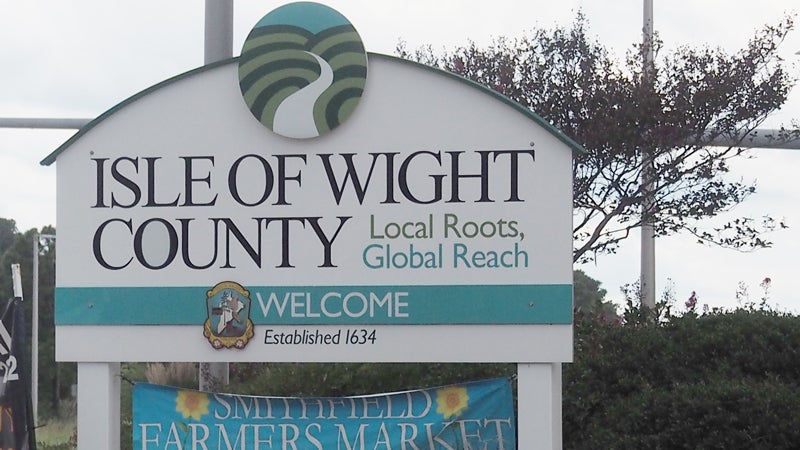Isle of Wight loses building appeal
Published 1:38 pm Wednesday, March 8, 2017
What’s a farmer? She is, said state
By Diana McFarland
Managing editor
The State Building Code Technical Review Board, as well as Isle of Wight’s own Board of Building Code Appeals overturned a ruling by the county’s building inspector over the construction of an equipment barn at Morgart’s Beach.
The dispute centered on the definition of a farmer, a farm structure and whether a certain percentage of income from farming is necessary to be exempt from a building permit.
Mike Smith, who had contracted with the applicant, Pinky Hipp, to build the structure, said he appealed to the county’s Board of Building Code Appeals because “we got tired of the bureaucratic machine.” {mprestriction ids=”1,2,3,4,5,6″}
“There are people in positions in the county that, in my opinion, they’re power hungry and cited things that didn’t even relate to her (Hipp),” said Smith.
After being overturned by the county’s appeals board, Isle of Wight Director of Inspections Arthur Berkley took the issue to the state board, where his interpretation was also overturned.
Hipp wanted to make her experience public due to the “principle” of the matter, and was concerned that other residents may have had a similar experience.
Hipp applied last fall for a zoning permit to build a three-sided equipment storage building for her horses on 25 acres that she and her husband own off Morgart’s Beach Road. The land is zoned rural agricultural conservation and Hipp said she also has an agriculture conservation easement applied to 15 acres of the property. Hipp grows hay and trains horses. Similar buildings built on the same property did not require a building permit in the past, according to an email from Smith to Smithfield Supervisor Dick Grice.
While applying for the zoning permit at the county’s “central permitting” office, Hipp was told she would also need to obtain a building permit because she didn’t derive 75 percent of her income from farming.
In addition to the cost of the permit, she would also need to provide engineering drawings, which cost from $1,500 to $2,000, said Smith. The cost of a building permit is determined by the size of the building. A zoning permit is $35.
Smith decided to appeal that ruling, citing an incorrect interpretation of the building code, according to the appeal documents filed with Isle of Wight County.
The county’s board overturned Berkley’s interpretation.
In a Sept. 15, 2016 email to Smith, Berkley said Virginia’s Construction Code was based on numerous sections of the Code of Virginia when it came to defining a farmer and farm structure.
Berkley said that in order to be a “farmer” and to receive relief from the cost of a building permit on the property, one would have to derive 51-75 percent of his or her income from farming activities.
Apparently this has been an issue for some time, given an internal memo to building inspections and permitting staff in 2015.
In the May 2015 memo concerning the “controversy” about building farm structures, Berkley said he had consulted with the county attorney to clarify the issue, citing Chapter 1, Section 102.3, but adding a yearly income requirement of 75 percent.
However, Chapter 1, Section 102.3 of the Virginia Construction Code, which is cited by Berkley as the definitive paragraph, does not mention a required percentage of income with regards to building a farm structure.
In addition to that section, the state board also cited Chapter 2 of the Construction Code, which states that a building used to shelter, raise, handle or process or sell agricultural animals is a farm building — and therefore afforded relief from the cost of a building permit. Also exempt is a building used to house equipment or materials used on the farm, according to the state’s ruling.
The income requirement does not apply in this case and it appears the building in question is to be used for farm animals, according to the January ruling from the state board. The state board ruling also said the county’s policy appeared to be pulled from unrelated portions of the Code.
Isle of Wight Assistant County Administrator Don Robertson said this distinction is an evolving issue as to how the state treats farming and farm activities — especially in light of the growing agritourism industry.
Robertson said Berkley had asked for a clear definition and direction from the state to building officials to narrow the definition.
To add clarity, Berkley looked to other code sections for definitions of farmers and farm buildings, Robertson said.
As for the Virginia Construction Code, “it’s extremely broad,” he said, adding that if one code is not clear, why not look to other code sections for added guidance.
Smith is a building contractor who works in Isle of Wight as well as other jurisdictions.
Smith said these sorts of experiences are not uncommon in Isle of Wight County.
“We live in a rural county. We don’t live in New York City,” he said. {/mprestriction}





